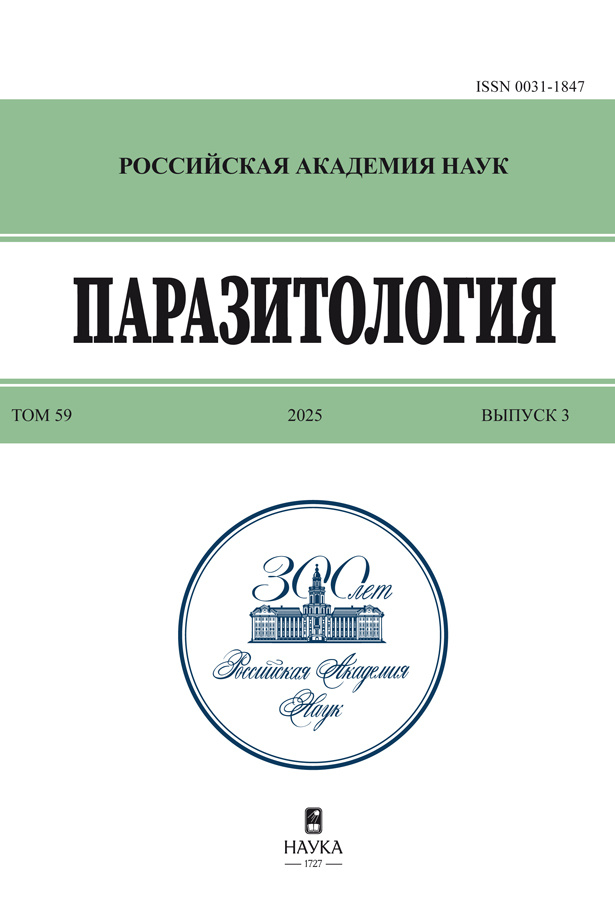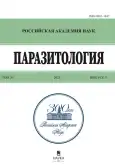Male longevity in Aedes (Ochlerotatus) communis (de Geer) and A. (O.) cantans (Meigen) (Diptera, Culicidae) reared from embryos in laboratory conditions
- Authors: Razygraev A.V.1
-
Affiliations:
- Зоологический институт РАН
- Issue: Vol 59, No 3 (2025)
- Pages: 215–223
- Section: Articles
- URL: https://rjsvd.com/0031-1847/article/view/687154
- DOI: https://doi.org/10.31857/S0031184725030020
- EDN: https://elibrary.ru/SXHGBI
- ID: 687154
Cite item
Abstract
Adult longevity in male mosquitoes Aedes (Ochlerotatus) communis (de Geer) and A. (O.) cantans (Meigen), reared from embryos in laboratory, was estimated. These two species were also compared with each other by the duration of development from egg hatching to adult emergence. Eggs (developed embryos, already passed through the diapause) were collected with fallen leaves and pieces of soil from under the snow at the edge of the pond, where large quantities of larvae of these species were spotted in the previous spring. A loose mass of fallen leaves and ground (1 L), containing mosquito eggs, was placed in a 10-L enamel container with cold (4°C) tap water. Water temperature gradually increased up to 21–22°С during several hours. After 2 days of incubation, water with hatched larvae was transferred to a new 10-L enamel container, while the most part of leaves and soil was removed. In this water, at 21–22°С and natural light regimen (during February–March at 59°51’N), larvae developed to pupae. Emerged adults were reared in groups in specially constructed transparent plastic containers with free access to sucrose and water, with mean environmental temperature 22.4°С, 50% air humidity inside containers, and natural light regimen. It was revealed that A. communis develops faster and emerges earlier than A. cantans: emergence of male A. communis and A. cantans started after 11.5 and 13 days, respectively, from the placement of the embryos in water, and lasted no more than 2.5 and 3 days, respectively. Adult longevity in males of A. communis was, in general, shorter than that in males of A. cantans: median values were 7.5 and 20 days for male A. communis and A. cantans, respectively. The results demonstrate that A. cantans males are more convenient for prolonged experiments under laboratory conditions than males of A. communis. Comparisons of present results with the previous data suggest that adults of A. cantans reared from embryos in a laboratory are, in general, not less viable than their conspecifics hatched and developed in pre-imaginal stages in natural conditions, and that there are differences in longevity in adult male A. cantans reared from different samples of embryos.
Full Text
About the authors
A. V. Razygraev
Зоологический институт РАН
Author for correspondence.
Email: a.v.razygraev@gmail.com
Russian Federation, Университетская наб., 1, Санкт-Петербург, 199034
References
- Медведев С.Г., Айбулатов С.В., Панюкова Е.В. 2010. Экологические особенности и распространение комара Aedes communis (De Geer, 1776) на территории Северо-Запада европейской части России. Паразитология 44 (5): 441–460. [Medvedev S.G., Aibulatov S.V., Panukova E.V. 2010. Ecological characteristics and distribution of the mosquito Aedes communis (De Geer, 1776) in the Northwestern part of European Russia. Parazitologiya 44: 441–460. (in Russian).]. https://www.zin.ru/journals/parazitologiya/content/2010/prz_2010_5_7_medvedev.pdf
- Разыграев А.В. 2022. О продолжительности жизни хаоборид (Diptera, Chaoboridae) при углеводном питании. Энтомологическое обозрение 101(2): 207–216. https://doi.org/10.31857/S0367144522020010 [Razygraev A.V. 2022. On longevity of adult chaoborids (Diptera, Chaoboridae) under sugar feeding conditions. Entomological Review 102(3): 279–285. (English translation of Russian version). https://doi.org/10.1134/S0013873822030010].
- Разыграев А.В. 2023. О высокой устойчивости к кратковременному промерзанию у зимующих комаров Culex territans Walker (Diptera, Culicidae). Энтомологическое обозрение 102(2): 241–248. https://doi.org/10.31857/S0367144523020041 [Razygraev A.V. 2023. Evidence of high tolerance to short-term freezing in overwintering mosquitoes Culex territans Walker (Diptera, Culicidae). Entomological Review 103: 270–275. (English translation of Russian version). https://doi.org/10.1134/S001387382303003X].
- Разыграев А.В. 2024. Продолжительность жизни самцов и самок Aedes (Ochlerotatus) cantans (Meigen) и A. (O.) communis (de Geer) (Diptera, Culicidae). Энтомологическое обозрение 103(3): 291–300. https://doi.org/10.31857/S0367144524030015 [Razygraev A.V. 2024. Longevity in males and females of Aedes (Ochlerotatus) cantans (Meigen) and A.(O.) communis (de Geer) (Diptera, Culicidae). Èntomologičeskoe obozrenie 103(3): 291–300. (In Russian). https://doi.org/10.31857/S0367144524030015]
- Andreadis S.S., Dimotsiou O.C., Savopoulou-Soultani M. 2014. Variation in adult longevity of Culex pipiens f. pipiens, vector of the West Nile Virus. Parasitology Research 113 (11): 4315–4319. https://doi.org/10.1007/s00436-014-4152-x
- Becker N., Petrić D., Zgomba M., Boase C., Dahl C., Lane J., Kaiser A. 2010. Mosquitoes and Their Control, 2nd ed. Berlin, Springer, 577 pp. https://doi.org/10.1007/978-3-540-92874-4
- Chant G.D., Baldwin W.F. 1972. Dispersal and longevity of mosquitoes tagged with 32P. The Canadian Entomologist 104 (6): 941–944. https://doi.org/10.4039/Ent104941-6
- Cox D.R. 1972. Regression models and life‐tables. Journal of the Royal Statistical Society: Series B (Methodological) 34 (2): 187–202. https://doi.org/10.1111/j.2517-6161.1972.tb00899.x
- Hubálek Z. 2008. Mosquito-borne viruses in Europe. Parasitology research (Suppl. 1) 103: 29–43. https://doi.org/10.1007/s00436-008-1064-7
- Jarosz A.F., Wiley J. 2014. What are the odds? A practical guide to computing and reporting Bayes factors. The Journal of Problem Solving 7: 2–9. http://dx.doi.org/10.7771/1932-6246.1167
- Kassambara A., Kosinski M., Biecek P., Fabian S. 2017. Package ‘survminer’. Drawing Survival Curves Using ‘ggplot2’ (R package version 03 1). [Пакет R] URL: https://cran.r-project.org/web/packages/survminer/index.html (дата обращения: 23 декабря 2023).
- Linde M., Tendeiro J.N., van Ravenzwaaij D. 2022a. Bayes factors for two-group comparisons in Cox regression. MedRxiv. [Препринт] https://doi.org/10.1101/2022.11.02.22281762
- Linde M., van Ravenzwaaij D., Tendeiro J.N. 2022b. baymedr: Computation of Bayes Factors for Common Biomedical Designs [Пакет R] URL: https://github.com/maxlinde/baymedr (дата обращения: 25 января 2024).
- Mehta C.R., Patel N.R. 2012. Exact Tests. Chicago, SPSS Inc, 226 pp.
- Morey R.D., Rouder J.N., Jamil T., Urbanek S., Forner K., Ly A. 2018. BayesFactor: computation of Bayes factors for common designs. [Пакет R] URL: https://cran.r-project.org/src/contrib/Archive/BayesFactor/ (дата обращения: 31 декабря 2021).
- Motulsky H. 2023. Comment to answer to: How to construct a confidence interval for p-value. URL: https://stats.stackexchange.com/questions/248524/how-to-construct-a-confidence-interval-for-p-value/630109#630109 (дата обращения: 18 декабря 2024).
- Pocock S.J., Geller N.L., Tsiatis A.A. 1987. The analysis of multiple endpoints in clinical trials. Biometrics 43(3): 487–498. https://doi.org/10.2307/2531989
- R Core Team. 2022. R: A Language and Environment for Statistical Computing. R Foundation for Statistical Computing, Vienna. URL: http://www.r-project.org/ (дата обращения: 23 июля 2022).
- Razygraev A.V. 2023. Catalase enzymatic activity in adult mosquitoes (Diptera: Culicidae): taxonomic distribution of the continuous trait suggests its relevance for phylogeny research. Zootaxa 5339 (2): 159–176. https://doi.org/10.11646/zootaxa.5339.2.3
- Renshaw M. 1991. Population Dynamics and Ecology of Aedes cantans (Diptera: Culicidae) in England (Doctoral dissertation, University of Liverpool). 186 p.
- Service M.W. 1977. Ecological and biological studies on Aedes cantans (Meig.) (Diptera: Culicidae) in southern England. Journal of Applied Ecology 14 (1): 159–196. https://doi.org/10.2307/2401833
- Schoenfeld D. 1982. Partial residuals for the proportional hazards regression model. Biometrika 69 (1): 239–241. https://doi.org/10.1093/biomet/69.1.239
- Soghigian J., Sither C., Justi S.A. et al. 2023. Phylogenomics reveals the history of host use in mosquitoes. Nature Communications 14: 6252. https://doi.org/10.1038/s41467-023-41764-y
- South S.H., Steiner D., Arnqvist G. 2009. Male mating costs in a polygynous mosquito with ornaments expressed in both sexes. Proceedings of the Royal Society B 276: 3671–3678. https://doi.org/10.1098/rspb.2009.0991
- Sun J., Yang S. 2022. Package ‘YPmodel’ [Пакет R] URL: https://cran.r-project.org/web/packages/YPmodel/YPmodel.pdf (дата обращения: 1 января 2024).
- Therneau T.M., Lumley T., Atkinson E., Crowson C. 2023. Package ‘survival’. [Пакет R] URL: http://brieger.esalq.usp.br/CRAN/web/packages/survival/survival.pdf (дата обращения: 23 декабря 2023).
- Wilkerson R.C., Linton Y.M., Strickman D. 2021. Mosquitoes of the World. Baltimore, Johns Hopkins University Press, 1308 p.
- Yang S., Prentice R. 2005. Semiparametric analysis of short-term and long-term hazard ratios with two-sample survival data. Biometrika 92 (1): 1–17. https://doi.org/10.1093/biomet/92.1.1
- Zhang D., Maiga H., Li Y. et al. 2024. Mating harassment may boost the effectiveness of the sterile insect technique for Aedes mosquitoes. Nature Communications 15: 1980. https://doi.org/10.1038/s41467-024-46268-x
Supplementary files












